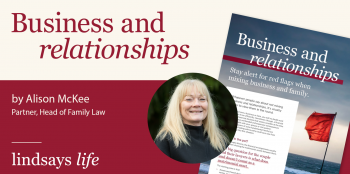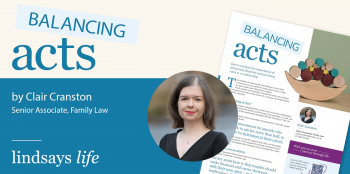In today’s Scotsman (Monday 17 June 2024), Alison McKee, Head of our Family Law team discusses the importance for prenups and postnups for anyone getting married or entering a civil partnership.
We are on the cusp of the summer weddings season. Couples are in the final frantic throes of ticking off checklist items for their big day. But all too many will have an essential item missing. And it is an omission which could prove to have far-reaching legal consequences. For among checking RSVPs, finalising photography and confirming catering, the couples best prepared for tying the knot or embarking upon a civil partnership are those who have “confirming our prenuptial agreement” among their tasks.
Modern relationship dynamics are increasingly complex with many couples having children when they marry or having acquired financial independence before they say ‘I do’. This means that prenuptial agreements are increasingly beneficial to those who are planning lives together but want to stay in control of their individual finances.
And it is important to realise that these are not just agreements for the rich and famous. They are for anyone bringing assets to a relationship or who anticipates a windfall during the marriage and wishes to control how their assets will be divided should they separate.
Yes, creating a prenup may not sound the most romantic of conversations. But, as we all know, emotion can often get in the way of good decision-making. So, what better time to consider what you would both like to happen should you separate than when you are both committed to the best interest of the other?
Instead of asking yourself whether a prenup is unromantic, a better question is: “Are they a good idea?”. Inevitably, “yes”.
They bring transparency and clarity. Irrespective of what the prenup contains, couples understand what each other wants and expects to happen in the unfortunate event of a separation.
Unlike in England, prenups in Scotland are treated as legally binding if both parties understood their terms and the agreement was considered fair and reasonable at the time of entering.
There are, however, practical aspects to prenups that should not be overlooked, and which are rarely obvious when doing online searches, which often do not explain the intricacies of Scots Law and are unlikely to lead to the tailored agreement needed to suit your individual circumstances, which is critical.
There is, though, often a gap between those who think and act when it comes to prenups. If that were narrowed, it would certainly reduce some strain for families in the unfortunate event of a separation.
What’s included in prenups is entirely up to the couple. Some choose an agreement which almost mirrors the laws around divorce, death and what happens to a partner’s assets. Others are more personalised - detailing who may take ownership of an item of sentimental value or who will retain the family pet.
Prenups should ideally be drawn up well in advance of your big day in order that couples can discuss and consider everything without the pressure of a deadline.
For couples who have left it too close, though, you could arrange a postnuptial agreement. Those who are already married or in a civil partnership and did not consider a prenuptial agreement sometimes turn to these if they receive a windfall or are restructuring a business during the marriage / civil partnership but wish to retain control of that windfall / company should they separate.
Amid your wedding buzz, conversations around prenups may not feel like a comfortable conversation. But they are undoubtedly sensible ones to have.
This article featured in the Scotsman on Monday 17 June 2024.






